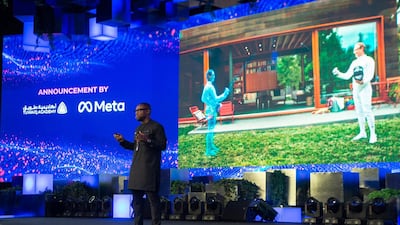Meta Platforms, the parent company of Facebook, has launched the Middle East and North Africa region's first metaverse academy in Saudi Arabia, as it aims to accelerate the development of the emerging technology.
The academy, which will be based in Riyadh and start on May 1, focuses on shaping the metaverse ecosystem by providing training to a set goal of 1,000 individuals in its first 18 months, California-based Meta told The National on Tuesday.
The initial announcement was made by Saudi Arabia's Ministry of Communications and Information Technology during the Leap technology exhibition in Riyadh.
Among the programmes to be offered are those in extended reality, as well as raising awareness of the technology. Graduates will be equipped to pursue careers in the metaverse and its related fields, Meta said.
“The Middle East and North Africa region has all the assets to become an essential player in the development of the metaverse and embrace the benefits it will bring to the economy,” said Kojo Boakye, vice president of public policy for Africa, the Middle East and Turkey at Meta.
“The business landscape is already in high demand for skills and we are committed to collaborating with educational institutions and policymakers across the region to accelerate the development of the ecosystem and train the future builders of the metaverse.”
The metaverse, based on Web3, is the virtual space where people represented by avatars can interact. It is also poised to reshape workplaces and businesses by using new techniques to streamline operations.
Web3, meanwhile, is the emerging new concept of the World Wide Web, with blockchain, decentralisation, openness and greater user utility among its core components.
The technology is projected to contribute about $15 billion to GCC economies annually by 2030, led by Saudi Arabia, a December study from Strategy& showed.
The Arab world's biggest economy is expected to account for more than half of the figure, or $7.6 billion, reflecting the aggressive programmes the kingdom has in place to leverage the metaverse, it said.
Saudi Arabia hosting the academy bodes well for the region. The kingdom, along with the UAE, Bahrain and Qatar, already have regulations in place and programmes encouraging the use of Web3 technologies.
Kuwait has implemented guidelines to approve digital banks, while Oman is studying how to regulate cryptocurrencies and virtual assets.
Globally, the technology is seen as an economic opportunity worth between $8 trillion and $13 trillion, heavily dependent on how much companies are willing to invest in the emerging innovation, according to consultancy PwC.
vice president of public policy for Africa, the Middle East and Turkey at Meta Platforms
“Our mission is to provide access to world-class education and skill development opportunities to individuals across the region,” said Faisal Al Khamisi, chairman of the Tuwaiq Academy.
The metaverse academy comprises three tracks, the first of which is inviting individuals to participate in a workshop to serve as an introduction to the metaverse.
The second is online training meant to develop people's skills in order to familiarise themselves with the creation of augmented reality effects, while the third is a professional training programme that will allow jobseekers to seek entry-level roles in immersive technologies.
The training programme, which targets at least 30 per cent of its cohort to be women, will be made available to anyone regardless of their educational background.
“This partnership with Meta allows us to continue this mission and support the growth of the Metaverse ecosystem by training and empowering the next generation of metaverse builders and leaders,” Mr Al Khamisi said.


